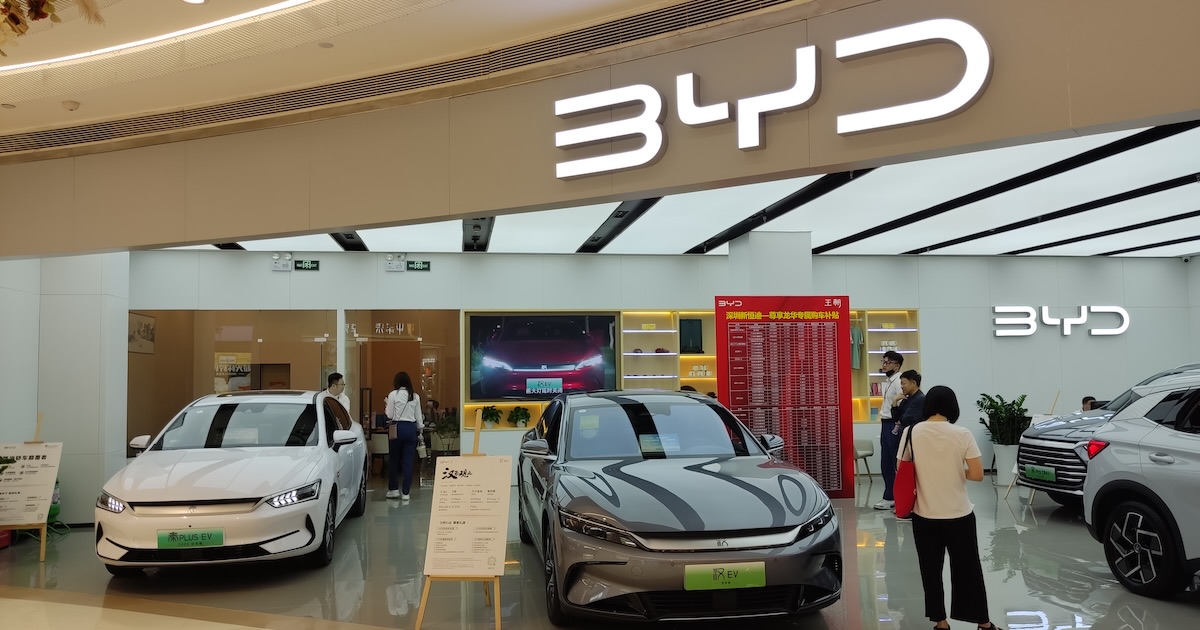
02 Jul 2024 Christopher Arps: Stop China From Spying on American Drivers
“Modern connected vehicles have morphed into data collection vacuums,” laments Project 21 Ambassador Christopher Arps in a commentary published at RedState.
“With China becoming the world’s top EV exporter — and the Chinese Communist Party having access to data collected by Chinese companies — this becomes an even more significant threat.”
Read Chris’s entire commentary below.
I believe China is the United States’ greatest enemy — both militarily and economically. Congress has pledged to make addressing the Chinese Communist Party’s threat to the American people one of its top legislative focus areas. Congress needs to ensure that the Communist Party’s ability to spy on American drivers is one of the issue areas that it speedily addresses. While Volvo is currently the only Chinese automotive company with significant sales in the United States, the swift rise of BYD, a Chinese multinational manufacturing company, could soon change this dynamic.
In the fourth quarter of 2023, BYD eclipsed Tesla as the world’s largest EV company by sales. The Chinese corporate giant has surpassed Japan as the world’s top EV exporter, continually expanding its reach to more developed markets. Because BYD sells cars for as low as $10,000, $20,000 less than the current cheapest electric vehicle in the U.S. marketplace, the Associated Press forecasted that this “rapid emergence…could shake up the global auto industry in ways not seen since Japanese makers exploded on the scene during the oil crises of the 1970s.” Sam Fiorani, a vice president at AutoForecast Solutions, added that “BYD’s entry into the U.S. market isn’t an if. It’s a when.”
Complicating matters is that modern connected vehicles have morphed into data collection vacuums. With China becoming the world’s top EV exporter — and the Chinese Communist Party having access to data collected by Chinese companies — this becomes an even more significant threat. The advancements in artificial intelligence used by car companies and our adversaries like China have only heightened U.S. consumers’ vulnerabilities.
General Motors and Ford have recently come under fire for gathering data from their drivers’ infotainment systems, GPS navigation, and other telematics services. This data includes, but is not limited to, their driving habits, location history, and even personal information synced from their smartphones — some of which the companies have reportedly sold to sectors like the insurance industry without their drivers’ consent, leading to premium increases.
Such practices have sparked debates about privacy and the ethical use of personal data, with consumers becoming increasingly concerned about how their information is being used and who has access to it. However, this issue takes on a whole new dimension when Chinese companies, which must follow the CCP’s strict data-sharing rules, do the harvesting.
Stating that “connected vehicles from China could collect sensitive data about our citizens and our infrastructure and send this data back to the People’s Republic of China,” the White House recently announced that it is investigating this issue and the steps it can take to resolve it. A bipartisan group of House lawmakers, led by House Energy and Commerce Chairwoman Cathy McMorris Rodgers (R-WA), are doing the same. They sent letters to ten Chinese companies conducting autonomous vehicle testing in the U.S. expressing concerns about their data collection, management, and use.
The lawmakers warned the companies that “There needs to be greater transparency around what information you collect while testing on American roads, and whether you are financially tied to the Chinese Communist Party.” While this early, proactive action from the executive and legislative branches is encouraging, Congress must follow up these investigations with hearings, subpoenas, and legislative markups — and soon. Nearly a year has elapsed since the legislative branch began exploring this issue.
Since then, BYD and a handful of other foreign conglomerates have surged in popularity and growth. The window for pre-emptive action will soon close, so Congress must act accordingly. In addressing the rise of these connected Chinese cars, Congress would be doing its constituents a disservice if it did not also explore adding new ground rules for domestic manufacturers.
The Commerce Department has said:
With the modern-day car essentially being a smartphone on wheels, it doesn’t take a lot of imagination to figure out how a foreign adversary like China, with access to this sort of information at scale, could pose a severe risk to our national security and the privacy of U.S. citizens.
Yet, American companies don’t seem to be curtailing their data-collecting practices in response to this increased Chinese hacking and espionage threat. Instead, they are striking consumer groups’ ire by improving their data collection without adding any safeguards.
Just two weeks ago, the Senate Finance Committee discovered that some U.S. automakers are working directly with Chinese suppliers, including ones that the law currently forbids them to work with due to their use of forced labor facilities. Since CCP laws mandate that nothing these Chinese auto companies do (and no information they collect) can remain independent of the state, U.S. manufacturers’ collaboration with these companies represents just as significant of a national security issue as a moral one. And earlier this year, the Commerce Department investigated the national security risks of foreign-made hardware and software in smart cars. Unfortunately, nothing yet has come of the investigation, and the Senate Finance Committee’s recent findings demonstrate the need for quick movement.
China already has restrictions on foreign vehicles, including a ban on Tesla cars in some of its sensitive government and military locations. China also mandates carmakers store and process much of their data directly in China. For our safety, security, and data privacy, it’s probably time for the United States to craft similar policies. Congress must follow China’s lead and begin implementing sensible regulatory frameworks for the auto industry that keep this vital industry safe. Further delay could lead to the world’s most powerful nation being lapped by the communist regime that seeks to steal its title.
Christopher Arps is an ambassador with the Project 21 black leadership network and a managing partner with the public affairs and communications consulting firm Red Tail Strategies. This was originally published at RedState.




